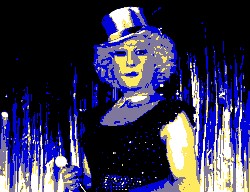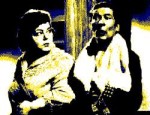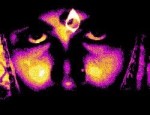Film Review

Whilst the first Cages aux folles film was concerned mainly with sending up contemporary attitudes to gay lifestyles, the sequel, disappointingly, is more preoccupied with parodying the film policier (the French crime-thriller). As a result, this later film is less appealing than the first (comic parodies of this type being two-a-penny in French cinema at that time) and the plot is really no more than second rate bande dessinée which soon runs out of steam.
As in the first film, it is Michel Serrault's unashamedly camp performance as the cross-dressing, hyper-neurotic Albin which saves the day and keeps the audience laughing, long after the jokes in the script have dried up. Unfortunately, within a decade of the film's release, this depiction of an overtly gay character had become hopelessly dated and, for many people, a tad offensive.
© James Travers 2002
The above content is owned by frenchfilms.org and must not be copied.
Film Synopsis
In Nice, the flamboyant impresario Renato still manages the popular night club La Cage aux folles with his transvestite partner Albin. When Renato suggests he is too old to impersonate Marlene Dietrich for his stage act, Albin goes off in a huff and intends to prove he is still attractive to other men. To his surprise, Albin soon finds himself being dragged off to a hotel room by a strange young man, unaware that armed secret agents are hot on their heels. When Albin's abductor is suddenly killed, Renato and Albin realise that they are in great danger. Sure enough it is not long before they are caught up in deadly game of counter-espionage involving a vital piece of micro-film. To make matters worse, Albin ends up having to meet Renato's mother...© James Travers
The above content is owned by frenchfilms.org and must not be copied.
Similar Films
Here are some other films you may enjoy watching:- Akoibon (2005)
- Carry on Spying (1964)
- La Grosse caisse (1965)
- Elle boit pas, elle fume pas, elle drague pas, mais... elle cause! (1970)
- The Intelligence Men (1965)
Other related links:
Film Credits
- Director: Edouard Molinaro
- Script: Jean Poiret (characters), Francis Veber, Marcello Danon
- Cinematographer: Armando Nannuzzi
- Music: Ennio Morricone
- Cast: Michel Serrault (Albin Mougeotte), Ugo Tognazzi (Renato Baldi), Marcel Bozzuffi (Broca), Michel Galabru (Simon Charrier), Paola Borboni (Mrs. Baldi), Benny Luke (Jacob), Giovanni Vettorazzo (Milan), Glauco Onorato (Luigi), Roberto Bisacco (Ralph), Gianrico Tondinelli (Walter), Giorgio Cerioni (Gunther), Nazzareno Natale (Demis), Antonio Francioni (Michaux), Stelio Candelli (Hans), Mark Bodin (Caramel), Tom Felleghy (Andrew Manderstam), Nello Pazzafini (Mangin), Danilo Recanatesi (Dr. Boquillon), Lorenzo Dannon (Terrorist), Roberto Caporali (Terrorist Accomplice)
- Country: France / Italy
- Language: French
- Support: Color
- Runtime: 101 min
The Carry On films, from the heyday of British film comedy

The best of Indian cinema

The greatest French Films of all time
